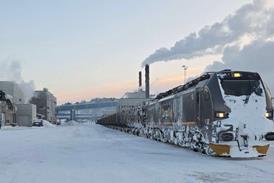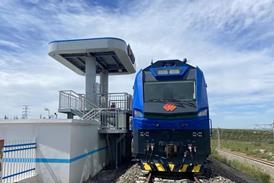GERMANY: Six hours of debate that stretched into the night of April 13 ended with the Social Democratic Party agreeing to offer up to 24·9% of Deutsche Bahn to the private sector. A government committee was expected to endorse the plans on April 28, paving the way for the sale process to be completed before the national elections scheduled for September 2009.
It has been an uncomfortable ride for Federal Transport Minister Wolfgang Tiefensee. Previous attempts to persuade the left wing of the SPD to sign up to a sale of 49·9% of DB had failed, and right up until the last minute it appeared that the latest proposals would also collapse. SPD leader Kurt Beck was holding out for regional and local passenger services to be excluded from the sale, a move opposed by Tiefensee, Finance Minister Peer Steinbrück and Chancellor Angela Merkel. The SPD had also called for non-voting shares to be issued in an attempt to prevent private-sector investors from exerting too much influence on railway policy.
In the end both propositions were rejected, and the SPD's coalition partners in the Christian Democratic Union welcomed the compromise as a 'good basis' for agreement. The proposals now expected to go forward envisage setting up a holding company in which up to 24·9% of the passenger, freight and logistics businesses will be structured for sale to private investors. Crucially, a state-owned company within the holding group will take ownership of track, stations and power supply; earlier attempts to include infrastructure in the sale package had fallen on a constitutional hurdle requiring ownership of the network to remain in state hands.
The CDU hopes that it will be possible to sell a further tranche of DB shares during the term of the next government, and it remains committed to putting 49·9% of the railway into private hands. In the meantime Tiefensee is selling the compromise agreement as 'decisive progress' that will open the door to private capital being made available for the rail business. 'Investment needs are huge', he said on April 15, noting that 'considerable sums' had been spent on the rail network, but that speed restrictions showed that yet more was needed.
A position statement, dated February 29, sets out the government's aims for the railway, which include reducing noise, raising energy efficiency and making improvements to stations. DB, which the statement says has 230 000 staff, must also be given the means to compete in the European market, while at the domestic level there is a commitment to 'secure contractually the size and quality of the network'. There is also a promise that the federal government will remain the majority shareholder.
- CAPTION: The first Alstom LHB Coradia Lirex Continental EMU for DB Regio (p321) arrived at Velim for testing last month

















